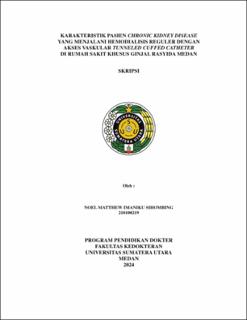Karakteristik Pasien Chronic Kidney Disease yang Menjalani Hemodialisis Reguler dengan Akses Vaskular Tunneled Cuffed Catheter di Rumah Sakit Khusus Ginjal Rasyida Medan
Characteristics of Chronic Kidney Disease Patients Undergoing Regular Hemodialysis with Tunneled Cuffed Catheter Vascular Access at Rasyida Kidney Hospital Medan

Date
2024Author
Sihombing, Noel Matthew Imaniku
Advisor(s)
Nasution, Bayu Rusfandi
Metadata
Show full item recordAbstract
Introduction: Chronic kidney disease (CKD) is one of the leading contributors to
morbidity and mortality rates worldwide, where end-stage patients require dialysis.
To perform dialysis, vascular access is needed, and tunneled cuffed catheters
(TCCs) are considered a viable option. Objective. This study aims to describe the
characteristics of the CKD patients with TCCs as their vascular access at Rasyida
Kidney Hospital. Methods: This study uses a descriptive method with crosssectional
design based on patient’s medical records. The sampling technique used
is total sampling. Result: A total of 96 patients with TCC vascular access found at
Rasyida Kidney Hospital from January 2021- August 2024. This study shows that
most patients were aged 61-75 years (39.6%), female (64.6%) had hypertension as
comorbidity (53.1%), had a history of double lumen catheter (CDL) access
(67.7%), insertion site being the right internal jugular vein (69.8%), indication was
silent AV shunt (55.2%). TCC duration is more than 12 months for 62.5% patients.
18.8% of patients experienced thrombus formation within the catheter. Conclusion:
This study concluded that the characteristics of CKD patients with TCC dialysis
access at Rasyida Kidney Hospital in Medan were individuals aged 61-75 years,
female, a history of hypertension, a history of CDL access, insertion site at the right
internal jugular vein, indication of silent AV shunt, TCC duration more than 12
months, and complications is thrombus formation within the catheter.
Collections
- Undergraduate Theses [2259]
